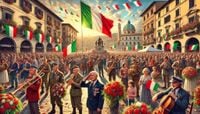Today, April 25, 2025, Italy celebrates the 80th Festa della Liberazione, a significant event in Italian history that commemorates the liberation of the country from Nazism and Fascism. This date, April 25, marks the day in 1945 when the retreat of German soldiers and the Republic of Salò from Milan and Turin began, leading to the end of a dark chapter in Italy's past.
The Festa della Liberazione has evolved into a symbol of the partisan resistance during World War II, and it is commemorated with various events across the nation. Among the most notable is the visit by the President of the Italian Republic and high-ranking state officials to the Milite Ignoto at the Altare della Patria in Rome. This solemn act honors the sacrifices made by those who fought for freedom.
As Italians reflect on this important day, they are reminded of the words of prominent figures who have shaped the narrative of freedom and resistance. Sandro Pertini, former President of Italy, famously stated, "The Constitution is a good document; but it is still up to us to ensure that certain articles do not remain dead letters, ink on paper. In this sense, the Resistance continues." His words resonate today as a call to action for citizens to uphold democratic values.
Another poignant reflection comes from Liliana Segre, a Holocaust survivor and senator, who remarked, "Cultivating Memory is still a precious vaccine against indifference and helps us remember that each of us has a conscience and can use it." This highlights the importance of remembering the past to prevent the repetition of history.
In addition to these reflections, many Italians share quotes that encapsulate the spirit of the day. For instance, Piero Calamandrei eloquently expressed, "Freedom is like air: you realize how valuable it is when it starts to run out." This sentiment captures the essence of the struggle for liberation and the need to cherish freedom.
Enzo Biagi, a revered journalist, noted, "April 25. A date that is an essential part of our history: it is also for this reason that today we can feel free. A certain Resistance has never ended." This statement serves as a reminder that the fight for freedom is ongoing and that vigilance is necessary to protect it.
The historical context of the Festa della Liberazione dates back to 1945 when the National Liberation Committee proclaimed an insurrection in all territories occupied by the Nazis and Fascists. The partisans, a diverse group consisting of communists, liberals, anarchists, Catholics, and republicans, played a crucial role in the resistance movement. Their united front was instrumental in overthrowing Mussolini's fascist regime.
In 1946, Alcide De Gasperi proposed that April 25 be declared a national holiday, a proposal that was institutionalized on May 27, 1949, with law 260. This recognition solidified the importance of the day in the collective memory of the Italian people.
As part of the celebrations, many Italians share messages and quotes that reflect their appreciation for freedom and the sacrifices made by those who fought for it. A popular quote from the song "Bella ciao" resonates deeply on this day: "And this is the flower of the partisan who died for freedom… Happy April 25!" This folk song has become synonymous with the Italian resistance and is often sung during commemorative events.
Furthermore, the day serves as a reminder of the ongoing struggles against oppression. As noted by Sergio Mattarella, the current President of Italy, "History teaches that when peoples barter their freedom for promises of order and protection, events always take a tragic and destructive turn." This warning underscores the need for constant vigilance in the face of rising authoritarianism.
In addition to political reflections, the day is marked by artistic expressions that celebrate freedom. The poetry of Giuseppe Ungaretti, who wrote, "Here live forever the eyes that were closed to the light so that all could open them forever to the light," speaks to the enduring legacy of those who sacrificed their lives for liberty.
As Italians gather to celebrate, they also recognize the importance of dissent and questioning authority. Bertrand Russell emphasized this when he said, "Never stop protesting; never stop dissenting, questioning authority, challenging common beliefs. There is no absolute truth. Never stop thinking. Be voices outside the choir. Be the weight that tips the scale. Always be in disagreement because dissent is a weapon." This call to action resonates strongly on a day dedicated to freedom and resistance.
In the spirit of the celebrations, many Italians also reflect on the ongoing challenges to democracy. As noted by Pier Paolo Pasolini, "The Resistance and the Student Movement are the only two democratic-revolutionary experiences of the Italian people. Around them is silence and desert: the indifference, the degeneration of the state, the horrible traditions of the Sabaudi, Bourbon, and Papal." His words serve as a reminder that the fight for democracy is never truly over.
As the day unfolds, various events, including speeches, parades, and cultural performances, take place throughout Italy, fostering a sense of unity and shared purpose among citizens. This collective remembrance of the past and commitment to the ideals of freedom and justice are what make the Festa della Liberazione a vital part of Italy's national identity.
In conclusion, the 80th Festa della Liberazione serves as a powerful reminder of Italy's history and the ongoing struggle for freedom. It is a day to honor those who fought against oppression and to reflect on the importance of vigilance in safeguarding democracy. As citizens gather to celebrate, they carry forward the legacy of the Resistance, ensuring that the values of liberty and justice remain alive for future generations.






